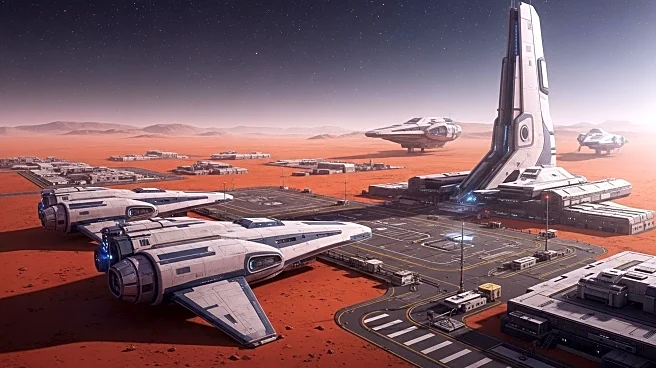What's Happening?
NASA, SpaceX, and other global space agencies are intensifying efforts to establish a self-sustaining human settlement on Mars by 2055. SpaceX CEO Elon Musk has outlined a plan to achieve this goal within 30 years, emphasizing the need for exponential increases in cargo deliveries to Mars during each launch window. The Starship rocket, central to this mission, is designed for reusability and aims to significantly reduce costs while delivering over 100 tons to orbit. Other entities, including NASA and the European Space Agency, are also contributing through programs like Artemis, which uses the Moon as a testing ground for deep space exploration. China has announced plans for a crewed Mars mission in the 2030s, and private firms are exploring innovations in space agriculture and closed habitats.
Why It's Important?
The push towards a Mars settlement represents a significant leap in human space exploration, potentially transforming how humanity views its place in the universe. The development of reusable rockets like SpaceX's Starship could lower the cost of space travel, making it more accessible and sustainable. This initiative could also drive technological advancements in life support systems and habitat construction, with potential applications on Earth. The collaboration among international space agencies and private companies highlights a global commitment to exploring new frontiers, which could lead to geopolitical shifts and new economic opportunities in space industries.
What's Next?
The next steps involve continued testing and refinement of the Starship rocket, with SpaceX planning further test flights to ensure reliability and efficiency. NASA and other agencies will continue their research and development efforts, focusing on life support systems and sustainable living conditions on Mars. The timeline for a Mars settlement will depend on the success of these technological advancements and the ability to secure funding and international cooperation. The upcoming Mars transfer windows will be critical for testing and deploying necessary infrastructure.
Beyond the Headlines
The ethical and logistical challenges of establishing a human presence on Mars are significant. Issues such as the long-term health effects of space travel, the sustainability of life support systems, and the potential environmental impact on Mars need to be addressed. Additionally, the legal and governance frameworks for extraterrestrial settlements remain underdeveloped, raising questions about sovereignty and resource management on Mars.










